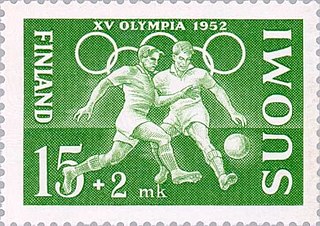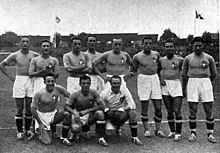
Football was one of the 154 events at the 1920 Summer Olympics, held in Antwerp, Belgium. It was the fifth time association football was on the Olympic schedule. The tournament expanded to 15 countries, including a non-European nation (Egypt) for the first time.

The Olympiastadion is a sports stadium at Olympiapark Berlin in Berlin, Germany. It was originally built by Werner March for the 1936 Summer Olympics. During the Olympics, the record attendance was thought to be over 100,000. Today the stadium is part of the Olympiapark Berlin.
The football tournament at the 1980 Summer Olympics started on 20 July and ended on 2 August. Only one event, the men's tournament, was contested. Seven qualified countries did not participate joining the American-led boycott in protest of the Soviet invasion of Afghanistan.

Peru competed in the Summer Olympic Games for the first time at the 1936 Summer Olympics in Berlin, Germany. 40 competitors, all men, took part in 16 events in 8 sports. Peru's participation in the Olympic Games forced the authorities to suspend the Peruvian football league for 1936.

Peru has officially participated in 19 Summer Olympic Games and 3 Winter Olympic Games. They did not send any athletes to the 1952 Summer Olympics. The Peruvian Olympic Committee is the National Olympic Committee for Peru which was founded in 1924 and recognized by the International Olympic Committee in 1936.

The association football (soccer) tournament at the 1984 Summer Olympics started on July 29 and ended on August 11, taking place throughout the United States. It was the first Olympic football competition in which officially professional players were allowed. Until then, the amateur-only rule had heavily favored socialist countries from the Eastern Bloc whose players were professionals in all but name. However, as agreed with FIFA to preserve the primacy of the World Cup, the Olympic competition was restricted to players with no more than five "A" caps at tournament start, regardless of age.
The football competition at the 1992 Summer Olympics featured 16 national sides from the six continental confederations. The 16 teams were drawn into four groups of four and each group played a round-robin tournament. At the end of the group stage, the top two teams advanced to the knockout stage, beginning with the quarter-finals and culminating with the gold medal match at Camp Nou on 8 August 1992.
The 1978–79 UEFA Cup was won by Borussia Mönchengladbach on aggregate over Red Star Belgrade.

The Football tournament at the 1952 Summer Olympics was won by Hungary.

Austria competed at the 1936 Summer Olympics in Berlin, Germany. 234 competitors, 217 men and 17 women, took part in 105 events in 19 sports.

Germany was the host nation and top medal recipient at the 1936 Summer Olympics in Berlin. 433 competitors, 389 men and 44 women, took part in 143 events in 22 sports.

The Empire of Japan competed at the 1936 Summer Olympics in Berlin, Germany. 179 athletes competed in 13 sports and also participated in art competitions. In art competitions, Japan won 2 bronze medals by Ryuji Fujita in paintings and also Sujaku Suzuki in drawing and water colours. As the country hosted the next Olympics that was supposed to be held Tokyo before cancellation, a Japanese segment was performed at the closing ceremony.

China, as the Republic of China, competed at the 1936 Summer Olympics in Berlin, Germany. 54 competitors, 52 men and 2 women, took part in 27 events in 7 sports. The team is the inspiration for the 2008 film, Champions.
The football tournament at the 1960 Summer Olympics was held from 26 August to 10 September in 1960 throughout Italy. The tournament featured 16 men's national teams from four continental confederations. The 16 teams were drawn into four groups of four and each group played a round-robin tournament. At the end of the group stage, the first-ranked teams of each group advanced to the semi-finals, and culminating with the gold medal match in Rome on 10 September 1960.

The Poststadion is a multi-use stadium in the locality of Moabit of the borough of Mitte in Berlin, Germany. The stadium was built in 1929 for the sports club of the German Reichspost at the site of a former Prussian Uhlan parade ground. It is adjacent to the Fritz Schloß Park.
Peru v Austria was a football match played on 8 August 1936 during the Summer Olympics at Hertha Platz in Berlin. The match became notable for causing controversy after it was annulled because of a pitch invasion from Peruvian supporters who had assaulted the Austrian players. Peru had three of its five extra time goals disallowed by the referee and ended up winning the match 4–2.

Olympiapark Berlin, previously the Deutsches Sportforum and the Reichssportfeld, is a sports and entertainment complex located in Berlin, Germany. The complex served as the Olympic Park of the 1936 Summer Olympics.
The 1936–38 Central European International Cup was the fourth edition of the Central European International Cup played between 1936 and 1938. It was played in a round robin tournament between five teams involved in the tournament. This edition of the tournament was interrupted due to the annexation of Austria to Nazi Germany on 12 March 1938.
The 2016–17 season was the 107th season of competitive football in Germany.

Peru Olympic football team represents Peru in international football competitions in multi-sport events such as the Olympic Games and the Pan American Games. The selection is limited to players under the age of 23, except three overage players. The team is controlled by the Peruvian Football Federation (FPF). Peru has participated in two Olympic football tournaments, one Pan American football tournament, and 7 Bolivarian football tournaments under this category.




















